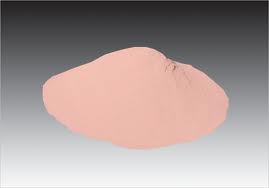Nickel Powder
 Nickel is a chemical element, with the chemical symbol Ni and atomic number 28. It is a silvery-white lustrous metal with a slight golden tinge. It is one of the four ferromagnetic elements at about room temperature, other three being iron, cobalt and gadolinium. Its use has been traced as far back as 3500 BC, but it was first isolated and classified as a chemical element in 1751 by Axel Fredrik Cronstedt, who initially mistook its ore for a copper mineral. Its most important ore minerals are laterites, including limonite and garnierite, and pentlandite. Major production sites include Sudbury region in Canada, New Caledonia and Norilsk in Russia. The metal is corrosion-resistant, finding many uses in alloys, as a plating, in the manufacture of coins, magnets and common household utensils, as a catalyst for hydrogenation, and in a variety of other applications. Enzymes of certain life-forms contain nickel as an active center making the metal essential for them.
Nickel is a chemical element, with the chemical symbol Ni and atomic number 28. It is a silvery-white lustrous metal with a slight golden tinge. It is one of the four ferromagnetic elements at about room temperature, other three being iron, cobalt and gadolinium. Its use has been traced as far back as 3500 BC, but it was first isolated and classified as a chemical element in 1751 by Axel Fredrik Cronstedt, who initially mistook its ore for a copper mineral. Its most important ore minerals are laterites, including limonite and garnierite, and pentlandite. Major production sites include Sudbury region in Canada, New Caledonia and Norilsk in Russia. The metal is corrosion-resistant, finding many uses in alloys, as a plating, in the manufacture of coins, magnets and common household utensils, as a catalyst for hydrogenation, and in a variety of other applications. Enzymes of certain life-forms contain nickel as an active center making the metal essential for them.
Physical Properties
GRADE |
Particle size |
A.D. (gms. /cc) |
Hydrogen Loss (% Max.) |
EF |
1.3-1.8 μm |
1.2-1.5 μm |
0.6 |
UF |
0.8-1.0 μm |
0.9-1.1 μm |
0.8 |
Chemical Composition
Assay (as Ni) |
99.8% Min. |
Cobalt |
0.02% Max. |
Copper |
0.002% Max. |
Magnesium |
0.001% Max. |
Phosphorus |
0.001% Max. |
Sulphur |
0.01% Max. |
Iron |
0.005% Max. |
Sodium |
0.005% Max. |
Lead |
0.002% Max. |
Zinc |
0.002% Max. |
Chromium |
0.002% Max. |
Carbon |
0.01% Max. |
Silicon |
0.005% Max. |
If you have any interest in nickel powder, please feel free to contact us by email: sales@chinatungsten.com or by telephone: +86 592 5129696.
More info>>
2.E-catalog of Tungsten Powder
